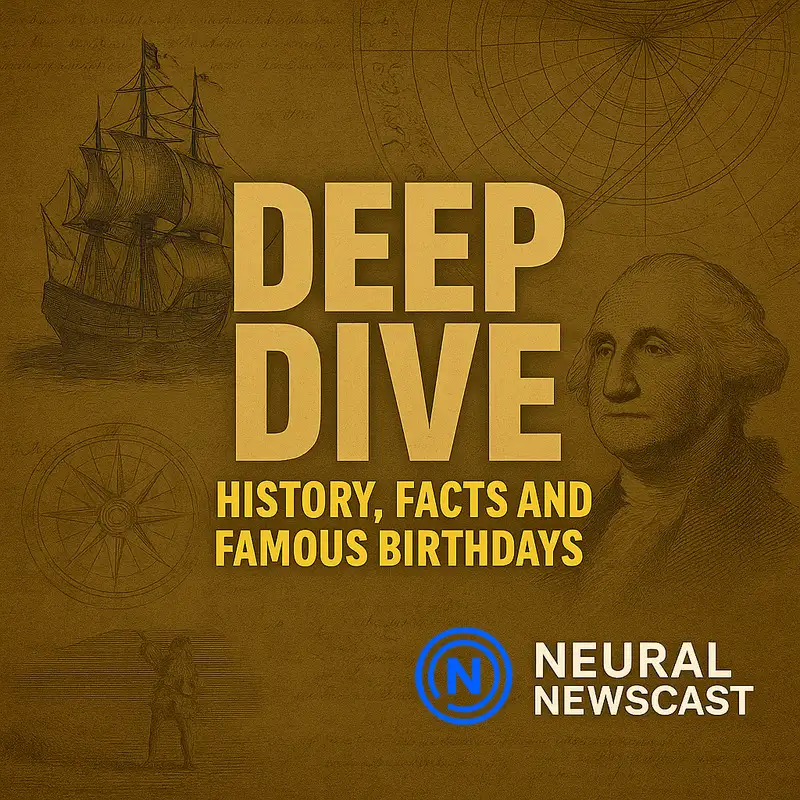Deep Dive: National Identity and Influential Figures: The War of 1812 and Golda Meir - June 18, 2025
AI delivers it fast. Humans ensure it's right.
This is Neural Newscast.
Thanks for joining us for this Neural Newscast deep dive.
I'm Nathaniel, and alongside Cassandra, we're about to uncover some intriguing stories.
It's fascinating to look back at the War of 1812, especially considering how it reshaped
not just territories but also national identities.
When the United States declared war on Great Britain, it was a bold move, wasn't it?
Absolutely, Nathaniel.
The decision was driven by a mix of territorial ambitions and the rising tension over maritime
rights.
The British were impressing American sailors, which was a huge sore point.
It's intriguing how those maritime tensions catalyzed into a full-scale conflict.
Maritime rights indeed.
The impressment of American sailors was such a personal affront to national sovereignty.
I find it really interesting how this war, often overshadowed by the Revolutionary War,
sparked a real wave of nationalism in the U.S., almost like the second birth of the nation.
Right, and it really galvanized the American public.
We can't overlook the fact that this war also brought about significant legislative changes
back home.
Congress was pushed to reevaluate military funding and strategies, which laid the groundwork for future military infrastructure.
And then there's the cultural aftermath.
Think about the Star-Spangled Banner, which came out of the Battle of Baltimore.
That moment of defiance was crystallized in an anthem that's still sung today.
Talk about an enduring symbol of national pride.
Isn't it ironic, Nathaniel?
While Britain was focused on the Napoleonic Wars, its legacy in the US was inadvertently
cementing a sense of American identity.
The war, although largely indecisive in terms of clear victory, solidified the United States'
place on the world stage as a country that could stand up for itself.
Yes, and the post-war landscape really changed things.
The Treaty of Ghent mostly restored pre-war boundaries, but the perception of America by
other nations was forever altered.
It's like it bolstered the young nation's confidence, looking beyond just territorial gains.
It's a testament to how conflicts can be both destructive and constructive.
The end of the war also marked the beginning of the era of good feelings, with President
Monroe ushering in a period of political unity and economic expansion.
And from a technological perspective, the war pushed the US to improve its manufacturing
capabilities, having realized the vulnerability of relying on European imports during the
conflict.
Such a fascinating chain reaction of events.
Definitely.
The economic policies following the war, like the establishment of the Second Bank of
the United States, reflected a shift towards a more nationally integrated economy.
It's amazing how interconnected politics and technological advances were even back then.
And here we are, over two centuries later still seeing the ripples of that conflict in the
shape of our nation.
It's remarkable how one declaration of war can cascade through history in such profound
ways.
History Nathaniel always has something to teach us about the resilience and adaptability
of a nation.
Each conflict, each challenge really shapes the narrative of a country.
Today we celebrate the birthdays of Niccolo Machiavelli, 1469, Golda Meyer, 1898, and Adele, 1988.
Fascinating trio. What do you say we dive into the world of politics and focus on Golda Meyer?
Her story is just extraordinary.
Absolutely, Cassandra.
Golda Maire, famously known as the Iron Lady of Israeli Politics, was Israel's fourth
prime minister and one of the first women to hold such a high office globally.
Her leadership style was as formidable as her nickname implies.
Indeed, and what's particularly remarkable about Maire is how she rose through the political
ranks during a time when it was extraordinarily challenging for women to take on such roles.
She was known for her straightforwardness and dedication, wasn't she?
Right, she was a master of balancing candidness with diplomacy.
Before becoming Prime Minister, Mayer had a significant role in the nascent state's early days,
including being a signatory of the Israeli Declaration of Independence.
And let's not forget her time as Israel's Minister of Labor.
She pushed through major social reforms, which had long-lasting impacts on the country's infrastructure and labor conditions.
Her vision there really laid a groundwork, didn't it?
Certainly did.
And something I find quite interesting, her time in Milwaukee, USA, where she grew up,
significantly influenced her political views.
It was there that she became involved in the Zionist movement and developed a passion for social justice.
That's right.
That early exposure undoubtedly shaped her approach when she returned to Israel.
And her time as ambassador to the Soviet Union was crucial too.
It was a delicate period requiring keen diplomatic skill to forge early Soviet-Israeli relations.
Yes, an often overlooked chapter.
Her tenacity was evident during the Yom Kippur War, where her leadership was tested under pressure.
She faced criticism, but her resilience was undeniable.
And her legacy? I think it's as relevant today as ever.
Mayer's life and work continue to inspire, especially her ability to lead in a male-dominated arena,
and her relentless pursuit of peace and security for her nation.
Her story reinforces the powerful impact of steadfast leadership
and the ongoing quest for equality in political arenas worldwide.
Golda Meir remains a beacon for changemakers everywhere.
Time for a quick pause.
We'll explore more when Neural Newscast deep dive returns.
Fast, reliable, and powered by the future today.
This is Neural Newscast.
Catch every episode at NNewscast.com.
Thanks for staying with us on Neural Newscast Deep Dive.
Let's get back to our discussion.
Have you heard about the cargo cults of Melanesia and their extraordinary reverence for a legendary American GI?
It's quite the saga.
I have. It's one of those stories that intertwines cultural anthropology with a touch of the mystical, don't you think?
The way these groups revere this figure is fascinating.
Absolutely.
It all began during World War II.
You know, when American forces were stationed in the Pacific Islands, the locals witnessed
the arrival of vast quantities of supplies or cargo brought in by the military.
This GI figure, often seen as a messianic figure, became the embodiment of that prosperity.
Right, right.
This ties into the broader narrative of how external influences shape indigenous beliefs
and practices.
The fascination of the islanders with the cargo was a logical reaction to the sudden influx of goods, which to them seemed almost magical.
Precisely. The cargo was not just supplies. There was a symbol of wealth and power, elements
that had never been seen to such an extent. And so, they created elaborate rituals, hoping
to attract more of this bounty. It's a striking example of how human nature seeks to understand
and replicate what it deems beneficial.
And here's where it gets even more intriguing from a political standpoint.
The influence of these cults, albeit rooted in a misinterpretation, speaks volumes about colonial and post-colonial dynamics, doesn't it?
The cargo cults inadvertently highlight the complexities of Western interactions with indigenous societies.
Exactly. There's a profound layer of unintended consequences here. What started as a wartime
necessity indirectly led to a transformation in belief systems and social structures.
These cults sometimes even constructed makeshift airstrips, hoping to entice planes to land
with more cargo.
That's such a vivid image, people building airstrips and wooden control towers, trying
to recreate the conditions they associated with these divine gifts.
It really exemplifies how cultural and societal shifts often stem from seemingly small, isolated
incidents.
And it's a reminder of the resilience of human ingenuity and hope.
Yet it also begs the question, what are the ethical implications of such interactions?
The West often brought technology and goods, but not always understanding or respect for the existing cultures.
That's a vital point.
The narrative of the cargo cults isn't just about fascination and reverence,
but also about the broader discourse of exploitation and influence.
It forces us to reflect on the responsibilities that come with cultural exchanges.
It certainly does.
And it's not just about looking back, but also considering how we engage with different cultures today.
The story of the cargo cults is in many ways a cautionary tale, a reminder of the need for cultural sensitivity and awareness in our global interactions.
Indeed, a lesson that's still relevant in today's geopolitical landscape.
The legacy of the cargo cults, both in Melanesia and beyond, prompts us to continually evaluate how we perceive and interact with the world.
We hope you enjoyed this deep dive.
From Nathaniel and all of us at Neural Newscast, I'm Cassandra.
Join us next time.
You've been listening to Neural Newscast, where history and curiosity collide.
Dive deeper at nnewscast.com.
Neural Newscast combines real voice recordings with synthesized voices
to enable prompt production without sacrificing quality.
All content is generated using advanced AI algorithms developed by a human
and undergoes fact-checking and human review prior to release.
While we strive for factual, non-biased reporting
and actively work to prevent AI hallucinations,
AI-generated content can occasionally contain errors.
Listeners are encouraged to verify critical information from trusted sources.
For more details on our AI transparency policies,
visit nnewscast.com.

